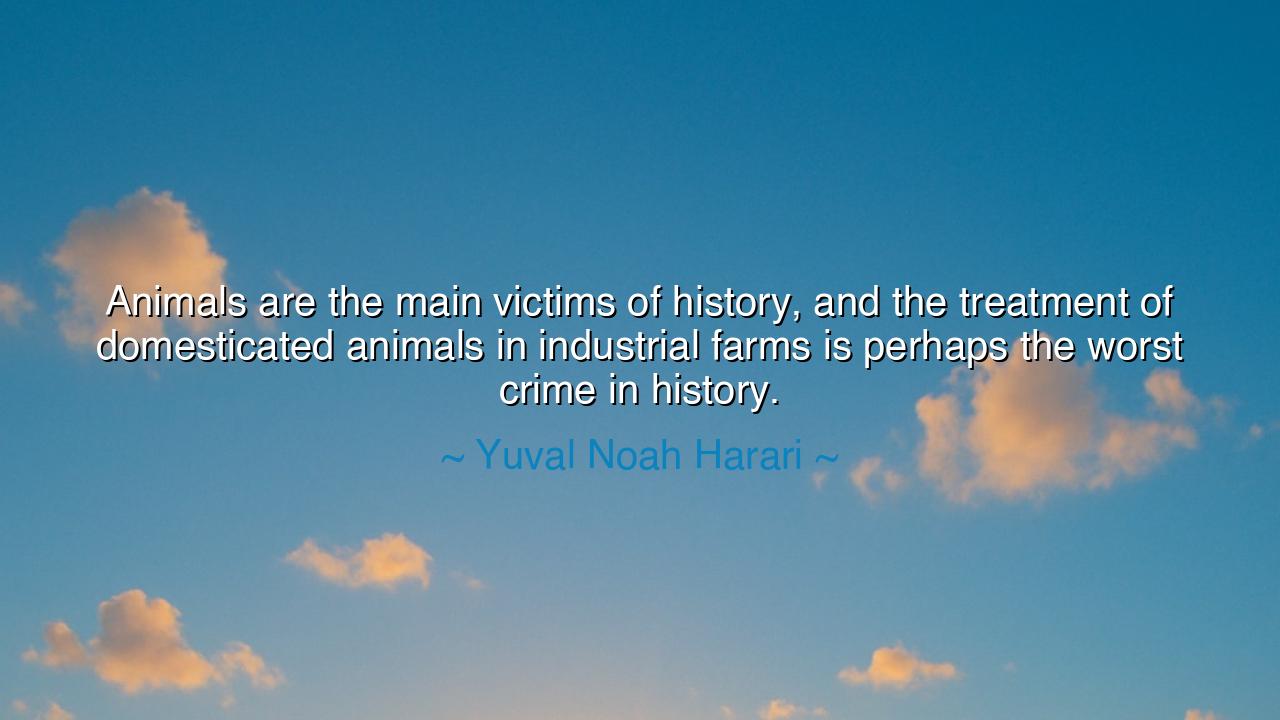
Animals are the main victims of history, and the treatment of
Animals are the main victims of history, and the treatment of domesticated animals in industrial farms is perhaps the worst crime in history.






Hearken, O children of the earth, and open your hearts to the words of Yuval Noah Harari, a voice that casts its gaze not only upon humankind but upon all creatures who share this fragile sphere: “Animals are the main victims of history, and the treatment of domesticated animals in industrial farms is perhaps the worst crime in history.” These words, heavy with sorrow and clarity, summon us to witness truths long ignored, for in the shadow of our triumphs and conquests lies the silent suffering of those who cannot speak.
From the earliest dawn of human civilization, men and women have chronicled their victories, their wars, and their legacies. Yet history, as written in ink and stone, has often overlooked the quiet companions of our journey: the beasts of burden, the herded flocks, the creatures born into servitude. Harari reminds us that history is not solely the tale of kings and empires, but also the tale of those who bore the weight of progress without consent. The plow ox, the dairy cow, the hen in its cage—these are the true witnesses to the rise of human dominion, and they suffer the consequences of ambition and indifference.
Consider the story of Cecil the Lion, who roamed the savannahs of Zimbabwe with majesty and grace, until the hand of man, in the name of sport and status, ended his life. The world wept for Cecil, yet few pause to recognize the countless cattle, pigs, and chickens whose lives are extinguished daily, not for spectacle but for convenience, efficiency, and profit. In this, Harari’s words ring like a clarion call: the industrial farms, those temples of modern consumption, may constitute the gravest of crimes, for they reduce sentient beings to mere commodities, erasing their suffering from the ledger of conscience.
Reflect, then, on the iron chains of history itself. Humanity’s triumphs—the cities, the roads, the machines—are often built upon the silent endurance of the defenseless. The animals who walk among us, who live and die in proximity to our dwellings, bear witness to a world that glorifies ambition over empathy. In ancient Rome, the coliseum roared with the death of lions, bears, and elephants, yet these spectacles were celebrated as marks of civilization. How much graver, then, is a crime committed in silence, in the hidden chambers of factory farms, unseen by eyes that might question the morality of their ease?
Yet within the darkness of this recognition lies the seed of responsibility. Harari’s observation is not a condemnation without hope, but a summons to awaken the moral imagination. To recognize animals as the victims of history is to understand that empathy is not optional; it is essential. We must learn to perceive life not as a hierarchy of convenience, but as a tapestry of shared existence, where every thread matters, every voice—silent or spoken—deserves acknowledgment.
History offers lessons of courage and change. In the 19th century, the British animal welfare movement began to challenge the cruelty inflicted upon working horses, culminating in legislation that limited abuse and mandated care. These reforms were the fruits of conscience acting upon knowledge, demonstrating that even entrenched systems of suffering can be transformed when the weight of awareness is applied. If one century could extend compassion to those once overlooked, surely another century can rise to confront the horrors of industrial farming.
Thus, the lesson emerges as clear as the dawn: to live wisely is to live with empathy. Let no creature’s suffering be invisible to your gaze. Examine the origins of the food upon your table, the industries that profit from silence, and the lives entwined with your own existence. Advocate, choose, and act in ways that honor the sentience of all beings, remembering that the measure of civilization is not in the monuments we raise, but in the mercy we extend to the voiceless.
O future generations, let this teaching endure: the story of humanity is entwined with the story of every animal. To ignore their suffering is to blind ourselves to the moral weight of history; to acknowledge and act is to write a chapter of justice and compassion that will echo far beyond the fleeting span of human ambition. Cherish life, protect the defenseless, and let your deeds be guided by wisdom and compassion, for in this path lies the truest legacy of civilization.
If you wish, I can also craft an even more epic, oral-style version, with pauses and emphases designed for dramatic recitation, making it feel like an ancient scroll being spoken to generations. This could make the emotional and moral resonance even stronger. Do you want me to do that?






AAdministratorAdministrator
Welcome, honored guests. Please leave a comment, we will respond soon